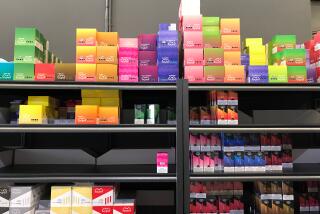Tobacco Companies Lose Ruling
- Share via
NEW YORK — In a blow to the tobacco industry, a federal judge ruled Monday that a jury should decide whether tobacco companies must pay tens of millions of smokers as much as $200 billion for allegedly duping them into buying “light” cigarettes over the last three decades.
The cigarette makers said they would appeal but their shares sank on Wall Street as the ruling granting class-action status to the case clouded what had appeared to be an improving legal environment for the industry.
Altria Group Inc., parent of the nation’s largest cigarette maker, Philip Morris USA Inc., said the ruling would delay its long-awaited restructuring plan, which includes a divestiture of its controlling stake in Kraft Foods Inc.
Altria attorney William S. Ohlemeyer said that a prerequisite to pursuing the company’s restructuring plan was clarity in the overall litigation environment.
“Today’s decision is not a step toward clarity. It is a step back of sorts,” he said.
His comments came after U.S. District Judge Jack Weinstein granted class-action status to a lawsuit against Marlboro maker Philip Morris USA, its biggest U.S. rival R.J. Reynolds Tobacco Co. and other cigarette manufacturers.
“The plaintiffs are entitled to the chance to prove their allegations,” Weinstein said. The judge set a trial date of Jan. 22.
The tobacco companies prefer trying each case on its own, saying circumstances vary widely from one person to another.
“We obviously disagree with the ruling -- strongly,” said Theodore Grossman, an attorney for Reynolds American Inc.’s R.J. Reynolds Tobacco division. “The law doesn’t support class certification.”
Ohlemeyer, vice president and associate general counsel for Altria Group, had said manufacturers would “seek a stay of all trial court proceedings pending a decision by the appellate court.”
The suit, filed in 2004, alleges that the tobacco companies responded to mounting health concerns with a marketing scheme to promote light cigarettes as a lower-risk alternative to regular cigarettes, even though their own internal documents showed that they knew the risks were about the same.
Michael D. Hausfeld, an attorney representing smokers, said the decision could clear the way for one of the largest class-action cases ever, both in number of plaintiffs and amount of damages. He estimated that the class -- consisting of anyone who purchased cigarettes that were labeled “light” or “lights” after they were put on the market in the early 1970s -- could number as many as 60 million.
“It’s an extremely significant ruling,” Hausfeld said.
Last year, however, the U.S. 2nd Circuit Court of Appeals in New York threw out Weinstein’s decision in a 2002 case in which he certified the first-ever nationwide class action against tobacco companies.
The panel ruled that the judge had stretched the boundaries of the law by allowing the plaintiffs to seek only punitive damages.
In Monday’s lengthy ruling, Weinstein said the class certification was necessary because “no individual can afford to prosecute the case alone.” Any flaws in the case, he added, were outweighed by the need to put it before a jury.
The judge also said he would “entertain a motion to extend the class ... to encompass smokers of all ‘low tar’ brands rather than ‘lights’ alone.”
Shares of Altria Group sank $5.26, or 6.4%, to $77.06. Reynolds American fell $2.27, or 3.7%, to $59.75 and Loews Corp., parent of Lorillard Tobacco, fell 20 cents to $37.80.
More to Read
Inside the business of entertainment
The Wide Shot brings you news, analysis and insights on everything from streaming wars to production — and what it all means for the future.
You may occasionally receive promotional content from the Los Angeles Times.










